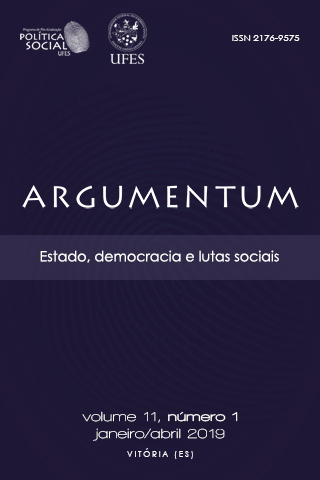Os soviets na Revolução Russa: um balanço de 1905 E 1917
DOI:
https://doi.org/10.18315/argumentum.v11i1.19536Abstract
O presente artigo trás como objeto de investigação os “soviets” com a finalidade de lançar considerações acerca de sua constituição durante a primeira (1905) e a segunda (1917) Revolução Russa. Para tanto, se partiu da seguinte inquietação: “Quais as características que particularizam os soviets de 1905 e de 1917 no curso da Revolução Russa?”. O despertar da temática se fez pela própria recordação aos 100 anos de sua feita na história e da atualidade expressa pelo processo: a construção de uma nova ordem social em alternativa a sociedade burguesa moderna. Para viabilizar o processo de investigação, utilizou-se de pesquisa bibliográfica e qualitativa. As principais inferências obtidas foram de que apesar dos soviets de 1905 e de 1917 apresentarem particularidades, ambos não estão desarticulados entre si; ao contrário, a ascensão do primeiro é a própria condição que fez emergir o segundo.
Downloads
Downloads
Published
How to Cite
Issue
Section
License
Copyright Transfer Agreement
As a condition for submission, the authors must agree with the Copyright Transfer Agreement, by checking the box after reading the clauses.
The author(s) (hereinafter "AUTHOR") hereby agrees to transfer, without any financial compensation, the property of copyrights regarding Argumentum, a journal of the Postgraduate Program in Social Politics (Programa de Pós-graduação em Política Social), Federal University of Espírito Santo (Universidade Federal do Espírito Santo) - Av. Fernando Ferrari, 514 - Goiabeiras 29075-910, Vitória (Brazil), (hereinafter "ARGUMENTUM"), according to the following terms and conditions:
1. I am aware of the terms of "Care Ethics Research Guide" described in the Policies section.
2. AUTHOR warrants to be the writer and copyright holder of the WORK submitted.
3. AUTHOR declares that the WORK does not infringe the rights of third-parties; that the distribution of images (if existent) was authorized; and that AUTHOR assumes total moral and property responsibility for their content.
4. AUTHOR agrees to transfer all the copyrights concerning the WORK to ARGUMENTUM, especially the rights to edit, publish, translate into another language, and reproduce it through any process or technique. ARGUMENTUM becomes the exclusive owner of the rights regarding the WORK, and any total or partial reproduction, in any other medium, printed or electronic, is strictly forbidden without prior written consent by ARGUMENTUM.
5. The copyright transfer is unpaid and, therefore, there will be no monetary compensation whatsoever by ARGUMENTUM in order to use the TEXT.

